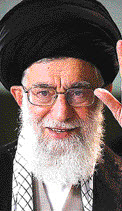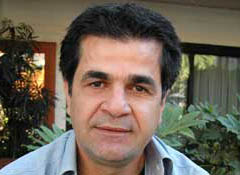July 11, 2014

Supreme Leader Ali Khamenehi has surprisingly proclaimed a love for some kinds of Western music.
However, he failed to indicate what kinds he likes and what kinds he finds offensive.
The new revelation came in a series of English-language tweets carried on a Twitter account that Khamenehi’s office says is not run by Khamenehi but by supporters. However, most people believe no tweets are run unless Khamenehi’s office has approved them. And a key point is that no tweet has ever been disclaimed by Khamenehi’s office.
Khamenehi’s music preferences were revealed on the occasion of World Music Day. Khamenehi praised the West’s “instructive and meaningful” music.
“You know that I’m anti-western, yet by reasoning I confirm the positive qualities of West; one of which is issue of #music,” read one tweet in slightly garbled English.
“It’s true that in West there’s decadent #music for dancing & debauchery, but instructive & meaningful music also have long existed there,” a second tweet said.
Besides “decadent music,” a third tweet added, the West produced “some types of music … that a wise transcendental person can enjoy it in concerts.”
The praise continued in a fourth message stating: “In West, there’s no shortage of #music that saved a nation or led intellectual groups [on] the right path; West had ¤tly has such qualities.”
Although it is frequently reported in the West that Ayatollah Khomeini banned all music for awhile after the revolution, that is not correct. State broadcasting actually relied very heavily on Western martial music during the Iran-Iraq War, with many of the marches of American John Phillip Souza proving especially popular. Souza was a major composer and also director of the US Marine Corp Band from 1889 to 1892.
Western classical music is heard frequently on state broadcasting. The regime’s main problem seems to be with modern pop tunes, especially those with a heavy beat.
Khamenehi spoke out against the promotion of music in universities during the 1997-2005 administration of Moham-mad Khatami.
And he has also raised some questions about traditional Iranian music. For example, he cautioned against using Iranian music to counter the Western “cultural invasion” of Iran. “It’s not an easy task to differentiate between haram [forbidden] and halal [permitted] music,” he told students in 1998. “I cannot say 100 per cent that traditional Iranian music is halal.”
Music that encourages people to sin and engage in “lustful conduct” is forbidden from an Islamic viewpoint, he said.
Khamenehi, 74, is understood to have played the sitar, a traditional Iranian stringed instrument, when he was young.
Western pop music is popular among many Iranians but is officially frowned upon—although instrumental versions of modern songs are heard in cafes, restaurants and shopping malls.
Despite his staunchly anti-Western political ideology and his frequent diatribes against the Western “cultural invasion,” Khamenehi has taken a surprisingly nuanced view of some of the West’s cultural products. He once described Western culture as “a combination of beautiful and ugly things.” telling Iranian youths: “No-one can say that Western culture is completely ugly.”
Known to be a voracious reader, he has listed Victor Hugo’s “Les Miserables” and John Steinbeck’s “The Grapes of Wrath” among his favorite novels. These works, of course, fit in with his view of evil Western societies—but he naively fails to notice that both books are freely published in the West while Persian works that similarly criticize the Iranian state are banned in Iran.
























